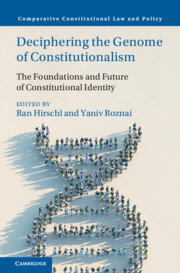Book contents
- Deciphering the Genome of Constitutionalism
- Comparative Constitutional Law and Policy
- Deciphering the Genome of Constitutionalism
- Copyright page
- Contents
- Figures
- Contributors
- Preface
- Acknowledgments
- Introduction
- Part I Foundations, Theory, and Concepts
- Part II Comparative Perspectives
- 8 Confucian Constitutional Identity
- 9 ‘(A-)Religious & Democratic’ Militant Dual Constitutional Identities and the Turn to Illiberalism
- 10 Constitutional Identity in Bangladesh
- 11 Clashing Identities?
- 12 Imposed Revolution?
- 13 India
- Part III American Constitutionalism and Constitutional Identity
- Part IV Emerging Trends
- Index
- References
10 - Constitutional Identity in Bangladesh
Complexity and Contestations
from Part II - Comparative Perspectives
Published online by Cambridge University Press: 14 March 2024
- Deciphering the Genome of Constitutionalism
- Comparative Constitutional Law and Policy
- Deciphering the Genome of Constitutionalism
- Copyright page
- Contents
- Figures
- Contributors
- Preface
- Acknowledgments
- Introduction
- Part I Foundations, Theory, and Concepts
- Part II Comparative Perspectives
- 8 Confucian Constitutional Identity
- 9 ‘(A-)Religious & Democratic’ Militant Dual Constitutional Identities and the Turn to Illiberalism
- 10 Constitutional Identity in Bangladesh
- 11 Clashing Identities?
- 12 Imposed Revolution?
- 13 India
- Part III American Constitutionalism and Constitutional Identity
- Part IV Emerging Trends
- Index
- References
Summary
Any constitution holds the nation’s past, aspires to live the present, and promises to build a thriving future. Differentiating a nation’s collective identity from its constitutional identity is, thus, often difficult, or even impossible. This chapter shows that, at its founding moment, Bangladesh’s national identity and constitutional identity merged into one another, although the national Bengali identity was flawed and exclusionary. Bangladesh’s four-pronged constitutional identity – based on the principles of nationalism, secularism, democracy, and socialism – evolved through a revolutionary and popular process but has since remained ever contested. These four identity principles have been subject to multiple changes, signifying their contestation and contentiousness. One possible reason for the continuing contestation about constitutional identity is, arguably, the ignorance of the religious sentiment of the Muslim majority citizenry. An analogous argument has been that Bangladesh’s constitutional (or national) identity is fraught with an exclusionary or hegemonic approach to nationality.
Keywords
- Type
- Chapter
- Information
- Deciphering the Genome of ConstitutionalismThe Foundations and Future of Constitutional Identity, pp. 125 - 137Publisher: Cambridge University PressPrint publication year: 2024

